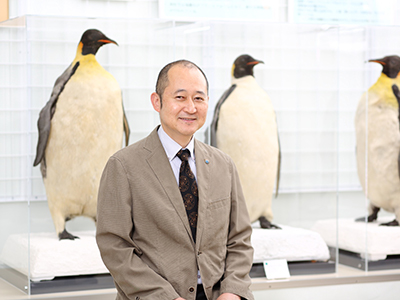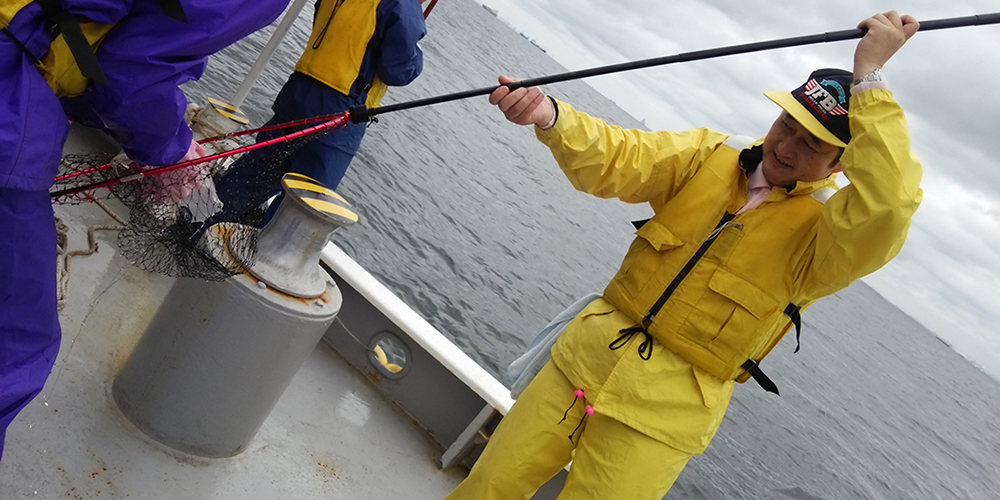People who convey voices from the sea
People who convey voices from the sea
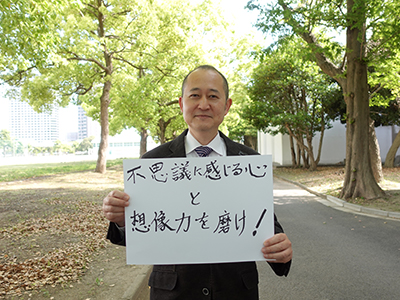
Biography
Koichi Kurose(Kurose Koichi)
Professor, Faculty of Marine Life Sciences
After graduating from the Faculty of Agriculture, Kyushu University, completed the Graduate School of Agriculture and the Graduate School of Medicine.
Pharmaceutical company researcher, Japan Society for the Promotion of Science Research Fellow, National Institute of Public Health Chief Researcher,
After working as Director of the National Institute of Health Sciences,
Professor at Tokyo University of Marine Science and Technology since 2013.
Dean of the Faculty of Marine Life Sciences from 2021.Doctor of Science.
- Q What kind of classes do you teach?
↓
- I teach food hygiene (Department of Food Production Science, 3rd year).
In class, we cover a wide range of food sanitation, including laws and regulations related to food sanitation, various topics related to food safety, food sanitation measures and risk management.
In particular, natural animal poisons are taught in more detail, partly because they are classes at the University of Marine Science and Technology.There are many poisonous creatures, but eating bees and poisonous snakes, for example, is not common, right?Natural animal toxins that can harm humans when eaten are all poisons derived from aquatic animals (fish and shellfish), such as puffer fish poison, shellfish poison, and ciguatera fish poison.Therefore, the natural animal poisons that cause food poisoning are mostly limited to marine toxins, and for that reason, I would like students, especially those at marine universities, to have sufficient knowledge of animal natural poisons.In addition, the incidence of food allergies caused by seafood is high in adults, and since this is my field of expertise, I also deal with food allergies in depth.
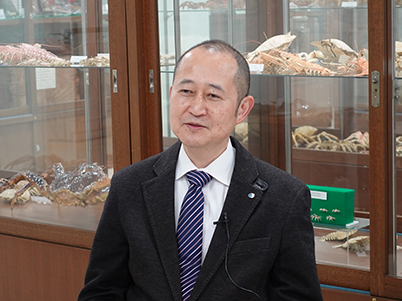
- Q What kind of research are you doing?
↓
- To introduce one of my research themes, we come into contact with various substances in our daily life, and we are developing a method to evaluate whether they have allergenicity or sensitization (a property that easily causes allergies). I'm here.It is important to evaluate the allergenicity of substances that humans ingest or come into contact with, such as foods, medicines, and cosmetics, before commercialization.In the past, cosmetics and other products were tested for safety using animal experiments.However, there is currently a global trend not to use laboratory animals out of consideration for animal welfare and efficiency in product development, and the development of other methods is urgently needed. .Therefore, we are researching whether it is possible to artificially create cultured human cells suitable for evaluating allergenicity and use them.The original cells are cultured cells of the human immune system, but because the human body is complex, it is not possible to reproduce the allergic reaction caused by the reaction of the entire body simply by using cultured cells of the immune system.Therefore, we are devising ways to reproduce allergic reactions by artificially imparting the functions of other cells to the cultured cells of the immune system.
- Q What kind of research are you focusing on now?
↓
- I think that many people have had an allergy test, but the cause of the allergy is identified after considering the relationship between what they ingested before the symptoms appeared after the allergy symptoms appeared. It is common to say thatHowever, in this case, it is not possible to test until after allergic symptoms appear.If you can predict whether a substance is likely to cause an allergy before ingesting it, you can avoid the causative substance without developing an allergy.We would like to establish such evaluation/prediction technology and use it for the development of new foods and medicines.Currently, I am conducting research targeting chemical substances.Originally, chemical substances themselves do not cause allergies, but some chemical substances have been reported to exhibit allergenicity when they enter the body and are metabolized to change their structure and stick to proteins. I'm here.
We would like to reproduce such changes in chemical substances in cultured cells.
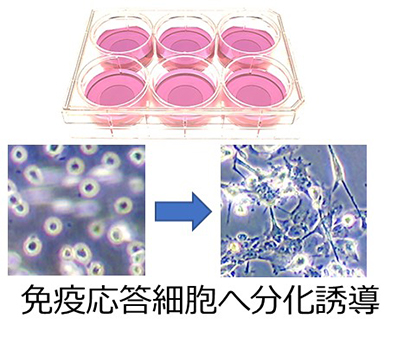
- Q Why do you study allergies at Marine University?
↓
- Allergies can occur not only to foods, but also to medicines and various substances around us.At the National Institute of Health Sciences, where I used to work, I was doing research on drug allergies.All allergy research is important, but food is something that everyone eats every day and is essential to life.That's why it's so important that food is delicious and safe for everyone.As I mentioned in class, one of the major food allergens for adults is seafood, so there is an advantage in conducting research on food allergies at the Ocean University. I have been conducting research on allergens inI would like to continue researching allergies by making the most of the unique advantages of being a marine university.
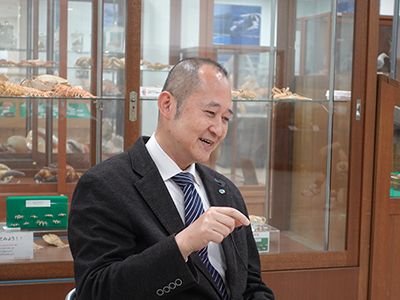
- Q What made you decide to become a researcher?
↓
- Ever since I was little, I have loved insects, fish, and creatures on the seashore.A biology teacher I met in high school had a doctorate and was a very interesting person.So he went on to Kyushu University's Faculty of Agriculture, where he encountered research on genes, the source of life, in the Department of Agricultural Chemistry.
Now every laboratory does it, but when I was a student, the technology for isolating and modifying genes was not yet widespread, so just being able to handle genes was exciting.In the laboratory I belonged to, I was immersed in research on jellyfish photoproteins using that technology.We introduced site-specific mutations into the photoprotein gene, expressed it in E. coli, and investigated the relationship between protein structure and function using luminescence as an indicator.I usually use a measuring device to check the state of light emission, but one day I wanted to see the light with my own eyes.So, I went into the darkroom by myself and added a little calcium to the photoprotein.Then, a bluish-white light flashed, and it felt very beautiful and mysterious.It's an emotional monopoly.It was found that the way of lighting changes depending on the modified part of the gene.Through repeated trial and error, I was excited about clarifying the relationship between how the genes are modified to change the way they emit light (function).
During my research, I found it very interesting to work through various trials and errors to solve or understand things that seemed strange to me, and it made me want to continue my research. rice field.After completing my master's course, I got a job at a research institute of a pharmaceutical company, but I couldn't forget the excitement of research at university. .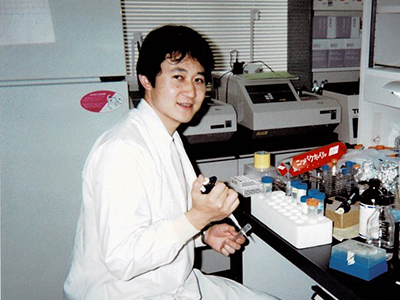
- Q: Looking ahead to 2030, what kind of research would you like to do with incoming students?
↓
- If you think about it normally, you might be talking about research that is useful to society, but in research at university, first of all, I want you to experience a sense of excitement.I often climb mountains, and I think that it's precisely because you aim for the top, step by step, that you get that exhilarating feeling at the top of the mountain.Even if you climb the mountain by car or get off by helicopter, you probably won't get as much excitement as if you climbed it yourself.Research is the same, aiming for the summit of understanding, climbing mountain paths where wonders are scattered while unraveling them step by step through trial and error.I consider this series of work to be research.The human immune system is very complex, and many studies are still being conducted around the world, and new discoveries are being reported.I would like to absorb more and more information like that and do research with students who will challenge the wonders of the allergy world together.
- Q To the young generation about to enter university
↓
- A heart that feels strange when you encounter something
I would like you to develop the ability to imagine why.
When you spend your days casually, it's hard to notice strange things.By all means, I want you to hone your sense of noticing strange things.
Also, I would like people to know that young people's sensibilities are fresh and have many sensitive aspects.That kind of feeling fades away as you get older.I think that I want you to cherish the present, which is full of senses.
